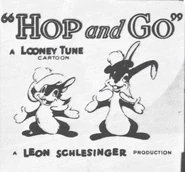Hop and Go is a 1943 Looney Tunes short directed by Norman McCabe.
Title[]
The title is a play on the phrase "stop-and-go."
Plot[]
Claude Hopper, a kangaroo and the "best darn hopper in the world," is narcissistic and dumb, so a couple of Scottish rabbits take him on. They set up a boxing ring; Claude gets tangled in the ropes. Next, he tries a distance leap, but the rabbits ride on his tail, then leap over as he lands. He tries again, without all the ballast in his pouch, but they've stuck his tail down with chewing gum. Claude falls into the river; the rabbits wash up in his water-filled pouch. Now they start coaching him. First, he's launched from a see-saw, bouncing off a zeppelin and right through the meat price ceiling; he lights a match to find out where he is and attracts anti-aircraft fire. The rabbits had given him a case of dynamite as "ballast"; he pulls it out, and falls, on Tokyo!
Censorship[]
- When this cartoon aired on Nickelodeon, the ending where Claude Hopper's jump destroys Tokyo edited the reveal that the city Claude destroyed was Tokyo by irising-in on Claude lying in the rubble and running the lip sync on a loop to keep the scene on Claude while the audio played normally.[3] This scene was also edited on MeTV by cropping out and zooming in the final scene to reveal only Claude on the rubble, leaving the iris out in the wrong position. It should be noted that this cartoon aired uncut when Cartoon Network (and, by proxy, Boomerang) aired this short as part of their ToonHeads episode about Norm MacCabe's short-lived directorial career with Warner Bros, and recently aired uncut on MeTV+'s Sunday Night Cartoons block.
Television[]
- Sunset Productions (1955-1968)
- Looney Tunes on Nickelodeon/Nick at Nite (1988 - 1992), edited
- ToonHeads [Cartoon Network and Boomerang] (2002 - 2003), uncut
- MeTV (2022-present), edited on MeTV, uncut on MeTV+
Availability[]
Looney Tunes Golden Collection: Volume 6, Disc Two (unrestored, with mixed audiotrack)
Notes[]
- When the bird is born and says "Mammy", it is the same recording from "Flop Goes the Weasel". Coincidentally, both were released one after the another.
- DVD releases of this cartoon use an unreleased stereo mix of its soundtrack. Some of the character dialogue's volume has been decreased, making it hard for viewers to understand the lines the characters say. Also, the opening rings do not appear for the first seven seconds of the cartoon, indicating that this is an unrestored print.[4]
- This similar problem of mixed audiotracks this cartoon had on DVD also appears on another bonus cartoon "Sniffles Takes a Trip", which also appears on Looney Tunes Golden Collection: Volume 6 DVD as a special feature, much like this cartoon.[5]
- In 2021, clips of this short's restoration were shown in a commercial for Saturday Morning Cartoons on MeTV. The restored short eventually aired 23 March 2022 on MeTV's Toon In with Me block.
- This cartoon entered the public domain in 1971 due to Warner Bros. failing to renew the copyright in time.
- This short's Vitaphone release number is 1054[6]
- This was the final short to feature the voice of Pinto Colvig before returning to Disney later that year [7].
Music-Cues[8][]
- Hippety Hop (by Carl W. Stalling)
- Sung by Claude Hopper at the beginning.
- Giddap Mule (by Leonard Ware)
- Plays when Claude introduces himself and hops around.
- The Irish Washerwoman (traditional)
- Plays when the rabbits first speak.
- Giddap Mule (by Leonard Ware)
- Plays again when Claude and the rabbit's land the first time.
- Giddap Mule (by Leonard Ware)
- Plays again when Claude and the rabbit's land the second time and when Claude empties his pocket.
- Loch Lomond (traditional)
- Plays when the rabbit pumps air into Claude.
- Singin' in the Bathtub (by Michael Cleary & Lyrics by Ned Washington and Herb Magidson)
- Sung by the rabbit as "Singin' in the Shower" and when one of the rabbits is talking to Claude.
- Loch Lomond (traditional)
- Plays again when Sandy the rabbit is leveraging the rock.
- Captains of the Clouds (by Harold Arlen)
- Plays when Claude flies past the planes and bounces off the dirigible.
- Jingle Bells (by James Pierpont)
- Plays when Claude breaks through the "Price Ceiling".
- Captains of the Clouds (by Harold Arlen)
- Continues playing after the "Price Ceiling" scene.
Gallery[]
References[]
- ↑ https://www.facebook.com/photo/?fbid=10165808603900578&set=pb.619090577.-2207520000
- ↑ https://cartoonresearch.com/index.php/animator-profiles-norm-mccabe/
- ↑ [1]
- ↑ https://www.youtube.com/watch?v=Z2yITNSWPLs&t=2s
- ↑ [2]
- ↑ https://books.google.com/books/about/Vitaphone_Films.html?id=mmtZAAAAMAAJ
- ↑ https://books.google.co.nz/books?id=e1RTP8thtR0C&pg=PA3&redir_esc=y#v=onepage&q&f=false
- ↑ https://www.imdb.com/title/tt0036015/soundtrack/









